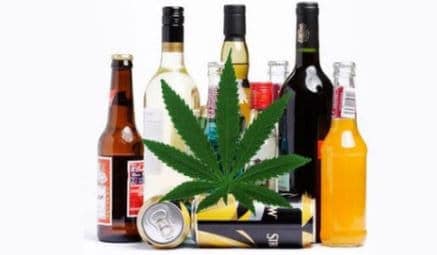In the 1930’s, cannabis was morphed into an illegal product, stoked by the greed of the timber industry and William Randolph Hearst, and the fiber industry with the DuPonts. The pharmaceutical industry had put their research and development into morphine derivatives and a host of other medications that patients could not grow in their backyard.
Now, that industry could stand to lose billions, as opioid use alone has been noted to decrease in medical cannabis states. Certainly, sales of other analgesics, antispasmodic meds and even antipsychotic drugs will also fall.
But Big Pharma is not the only industry that has begun to worry whether legalizing cannabis will reduce their sales. According to a new article in Forbes magazine, a joint study from two U.S. universities and one in South America claims a reduction in the U.S.’s overall alcohol consumption appears directly related to the rise of medical marijuana laws. The study done by the University of Connecticut, Storrs, , Georgia State University, Atlanta and Universidad del Pacifico, Lima; and Sungoh Kwon, identified a definitive relationship between wine and marijuana consumption.
According to Forbes, the research for this study used available Nielsen Retail Scanner alcohol sales data from 90 alcohol chain stores—grocery, convenience, drug, and mass distribution stores—from 2006-2015. They did it this way because they believed asking consumers does not provide reliable information, because many people do not reliably report their alcohol consumption habits.
Using the 90-chain data, the study compared alcohol sales of states that do not have medical marijuana laws and states with medical marijuana laws (before and after the laws were implemented). The researchers also included demographics (age, race) as well as economics (income) for the study because those areas make a measurable impact on alcohol consumption.
Data proves a drop in wine sales in legal Medical Cannabis states.
Over the ten years studied, counties located in medical marijuana states showed almost a 15 percent reduction in monthly alcohol sales.
The overall conclusion of the study is that marijuana and alcohol are strong substitutes for each other and therefore they share almost the same audience. This means that introducing legal marijuana where alcohol consumption is legal can result in a negative effect on alcohol sales.
Medical cannabis is legally sold to a small percentage of overall marijuana users, but this study may be an indicator of what the alcohol industry can expect in states where recreational marijuana laws go into effect that will increase legal access to every adult in the state.
Forbes noted that another aim of the study was to determine whether legalized marijuana could replace alcohol consumption altogether. The jury is still out on that question. In a recent Webinar concerning the state of the wine industry, host Rob McMillan, Silicon Valley Bank Wine Division president along with two wine industry guests stated flatly they see no evidence and do not believe legalized marijuana will be a major substitute for wine consumption. McMillan pointed out that beer is more likely than wine to suffer sales reductions. His reasoning: “wine compliments a meal, marijuana doesn’t”.
McMillan has a point, but something else needs to be considered: after smoking cannabis, many people eat more, and may not feel the need to compliment the meal with alcohol when they are already feeling good.
But one thing is for certain. studies like this are making the wine and alcohol industry feel paranoid. They may need a good high-CBD product or an indica for that.

